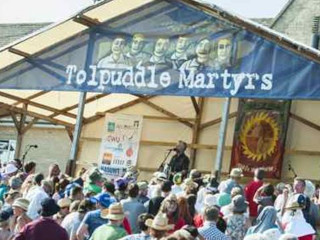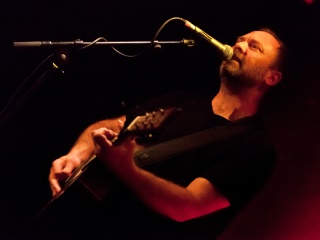Staffing a Julian Assange Defense Committee table at the Tolpuddle Martyrs' Festival only weeks after Julian Assange spent his 51st birthday in Belmarsh Prison, the parallels were impossible to ignore. You can also read this on my blog.


From some vantage points, there may be little relationship between the commemoration of a labor struggle involving farmworkers in 1830's Dorset that I sang at last weekend, and the imprisonment of a journalist in present-day London. But for all of the folks I know who have had their eyes on this connection for one reason or other, the parallels are veritably shouting for our attention.
In 1834, six hungry farmworkers who became known as the Tolpuddle Martyrs
swore a secret oath, that they would organize nonviolently to better the conditions of the farmworkers of Dorset, who lived wretched lives under the thumb of the Squire, the landowner, who was also the judge for the sham trial the men were subjected to. They were sentenced to "transportation" -- to the miserable, 111-day journey to the other side of the world, to split rocks beneath the blazing sun in Australia for seven years, a form of torture that many did not survive.
By 1834, forming a union had been legal under British law for a few years. But swearing a secret oath was another matter entirely, at least according to the Squire's court.
Around the country back then, people mobilized, seeing the stark injustice in the case of these farmworkers in Tolpuddle, and further seeing that if they could be charged with swearing a secret oath and sent to Australia, then this could potentially happen to anyone trying to form a union anywhere in the country. Although the families of the transported farmworkers were denied assistance from the state, supporters around the country looked after them well, and due to their ongoing mobilization the men were eventually pardoned, and brought back to England at the state's expense in 1836.
In 2019, an award-winning journalist and editor named Julian Assange was forcibly removed from the Ecuadorian Embassy by British police and taken to the supermaximum Belmarsh Prison on the outskirts of London, to be held without bail in solitary confinement, prevented from almost all communication with the outside world, to face extradition to the United States, whose Justice Department is pursuing charges against Assange under the 1917 Espionage Act, for exposing US war crimes in Iraq -- which had been classified, of course, and so Assange was thus exposing state secrets, punishable under the long-ignored Espionage Act with decades and centuries in prison.
In recent years, since all of Assange's worst predictions about the intents of the US government in his case have been proven accurate, support for his freedom and against his extradition to the US has been growing everywhere, including all over the UK. More and more people are realizing that if Assange can be silenced and put away for the rest of his life for the laws he has ostensibly broken, then the same thing could be done to any other journalist who does their job well. Journalists work with confidential sources and expose state secrets all the time, and are frequently awarded for this sort of thing -- including recently, with journalists in Russia and the Philippines receiving the Nobel.
The notion of continuing to imprison Julian Assange because he exposed state secrets -- illegal under this draconian law that hasn't been used in a century, that is blatantly in contradiction with all notions of press freedom -- increasingly terrifies journalists and anyone else who may currently be waking up to the fact that if they can prosecute Assange under the Espionage Act then they could just as easily prosecute the editor of the Guardian, the New York Times, Der Spiegel, El Pais, or any number of other journalistic outlets that have undoubtedly violated all of the same laws Assange has allegedly violated.
Saying that it's legal to form a union, but it's illegal to take a secret oath declaring that you have done so, is obviously troubling, and people up and down this island could see that back in 1834.
Saying it's OK to be a journalist, but if you do any investigations that turn up secret information and you publish any of it anywhere you may face the rest of your life in a supermax prison somewhere in the United States, is similarly contradictory, and increasing numbers of people can clearly see that today.
If those attending the Tolpuddle Martyrs' Festival last weekend might be a bit of a bellwether of progressive opinion in Britain today, which I think they very well could be, then the circumstantial evidence was everywhere. The table for the Julian Assange Defense Committee always had people at it, buying books and talking with those of us behind the table. Marching through town with the Free Julian Assange banner elicited nothing but supportive chants, shouts, and applause -- along with Jeremy Corbyn joining us to hold the banner and march with us for a couple minutes.
As a microcosm of the British left, those involved with this very labor movement-oriented festival are a collection of people with much that both unites and divides them. The evidence of the ongoing rift within the left around what I would emphatically characterize as completely false accusations of antisemitism of various Labor Party members is not hard to find. Neither is it hard to find the divide around how to react to the Russian invasion of Ukraine. But wherever someone stands on these matters, at least in these circles, support for Assange's freedom and opposition to his extradition to the US seems universal.
So broad is the support for Julian Assange, in fact, that for some it can be challenging, because his support does not come only from well-behaved leftists, but from lots of other folks as well, such as the folks who were putting me up in Dorset for the weekend, who I first came into contact with because of our mutual support for Assange. As the former treasurer for the Libertarian Party, my host and I have lots of political differences, but none when it comes to press freedom or Assange's freedom.
A groundswell of support for the wrongly-accused Tolpuddle Martyrs got them pardoned and returned to England within two years. A similar groundswell of support for this wrongly-accused, imprisoned journalist over the past few years has so far has not achieved his freedom. But the injustice involved in both cases could not be more outrageous, or obvious.
Last Saturday Soiree: Here's the concert I livestreamed from my living room on Saturday afternoon. I put together basic chord charts for 32 mostly relatively recent songs that I haven't gotten around to making sheet music for. You can find all the lyrics, audio, etc., to these and hundreds of other songs I wrote in the Songbook section of my website, at davidrovics.com/songbook.
Photo Credits:
(1) Tolpuddle Martyrs' Festival,
(2) David Rovics
(unknown/website).